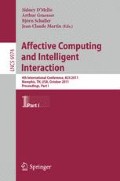Abstract
We propose a generic framework for the automatic usability evaluation of web sites by combining traditional automatic usability methods with affective computing techniques. To evaluate a framework a pilot study was carried out where users (n=4) reported their affective states using dimensional and categorical models. Binary task completion, time, mouse clicks, and error rates as an indicator of web usability were automatically captured for each page. Results suggested that frustration experienced when error rates and time for the task were higher. Delight on the other hand was at the other side of the spectrum. In the case that usability measurements had almost same values (e.g. confusing or engaging pages), affective states may be a way to show the difference.
Access this chapter
Tax calculation will be finalised at checkout
Purchases are for personal use only
Preview
Unable to display preview. Download preview PDF.
References
Cato, J.: User-centered web design. Pearson Education, London (2001)
Nielsen, J.: Usability engineering. Morgan Kaufmann, San Francisco (1993)
Paternò, F., Santoro, C.: Remote Usability Evaluation: Discussion of a General Framework and Experiences from Research with a Specific Tool. Maturing Usability, 197–221 (2008)
Ivory, M.Y., Hearst, M.A.: The state of the art in automating usability evaluation of user interfaces. ACM Computing Surveys (CSUR) 33, 470–516 (2001)
Paternò, F., Piruzza, A., Santoro, C.: Remote Web usability evaluation exploiting multimodal information on user behavior. In: Computer-Aided Design of User Interfaces V, pp. 287–298 (2007)
Picard, R.: Affective computing. The MIT Press, Cambridge (1997)
Dolan, R.J.: Emotion, cognition, and behavior. Science 298, 1191 (2002)
Aghaei Pour, P., Hussain, M., AlZoubi, O., D’Mello, S., Calvo, R.: The Impact of System Feedback on Learners Affective and Physiological States, pp. 264–273. Springer, Heidelberg (2010)
Klein, J., Moon, Y., Picard, R.: This computer responds to user frustration: Theory, design, and results. Interacting with Computers 14, 119–140 (2002)
D’Mello, S., Craig, S., Gholson, B., Franklin, S., Picard, R., Graesser, A.: Integrating affect sensors in an intelligent tutoring system, pp. 7–13 (2005)
Bianchi-Berthouze, N., Lisetti, C.L.: Modeling multimodal expression of user’s affective subjective experience. User Modeling and User-Adapted Interaction 12, 49–84 (2002)
Calvo, R.A., D’Mello, S.: Affect detection: An interdisciplinary review of models, methods, and their applications. IEEE Transactions on Affective Computing, 18–37 (2010)
Iso, I.: 9241-11. Ergonomic requirements for office work with visual display terminals (VDT’s). Part 11 (1997)
Hornbæk, K.: Current practice in measuring usability: Challenges to usability studies and research. International Journal of Human-Computer Studies 64, 79–102 (2006)
Petty, R.E., Fabrigar, L.R., Wegener, D.T.: Emotional factors in attitudes and persuasion (2003)
Sauro, J., Kindlund, E.: A method to standardize usability metrics into a single score, pp. 401–409. ACM, New York (2005)
Edwardson, M.: Measuring consumer emotions in service encounters: an exploratory analysis. Australasian Journal of Market Research 6, 34–48 (1998)
Partala, T., Kangaskorte, R.: The Combined Walkthrough: Measuring Behavioral, Affective, and Cognitive Information in Usability Testing. Journal of Usability Studies 5, 21–33 (2009)
Frøkjær, E., Hertzum, M., Hornbæk, K.: Measuring usability: are effectiveness, efficiency, and satisfaction really correlated?, pp. 345–352. ACM, New York (2000)
D’Mello, S., Graesser, A., Picard, R.: Toward an affect-sensitive AutoTutor. IEEE Intelligent Systems 22, 53–61 (2007)
Arroyo, I., Cooper, D., Burleson, W., Woolf, B., Muldner, K., Christopherson, R.: Emotion Sensors go to School (2009)
Calvo, R.A., D’Mello, S.K.: Affect Detection: An Interdisciplinary Review of Models, Methods, and their Applications. IEEE Transactions on Affective Computing 1, 18–37 (2010)
Vargas, A., Weffers, H., da Rocha, H.V.: A method for remote and semi-automatic usability evaluation of web-based applications through users behavior analysis, p. 19. ACM, New York (2010)
Calvo, R.A., O’Rourke, S.T., Jones, J., Yacef, K., Reimann, P.: Collaborative Writing Support Tools on the Cloud. IEEE Transactions on Learning Technologies 4, 88–97 (2011)
Desmet, P.: Emotion through expression; designing mobile telephones with an emotional fit. Report of Modeling the Evaluation Structure of KANSEI 3, 103–110 (2000)
Author information
Authors and Affiliations
Editor information
Editors and Affiliations
Rights and permissions
Copyright information
© 2011 Springer-Verlag Berlin Heidelberg
About this paper
Cite this paper
Aghaei Pour, P., Calvo, R.A. (2011). Towards a Generic Framework for Automatic Measurements of Web Usability Using Affective Computing Techniques. In: D’Mello, S., Graesser, A., Schuller, B., Martin, JC. (eds) Affective Computing and Intelligent Interaction. ACII 2011. Lecture Notes in Computer Science, vol 6974. Springer, Berlin, Heidelberg. https://doi.org/10.1007/978-3-642-24600-5_48
Download citation
DOI: https://doi.org/10.1007/978-3-642-24600-5_48
Publisher Name: Springer, Berlin, Heidelberg
Print ISBN: 978-3-642-24599-2
Online ISBN: 978-3-642-24600-5
eBook Packages: Computer ScienceComputer Science (R0)

